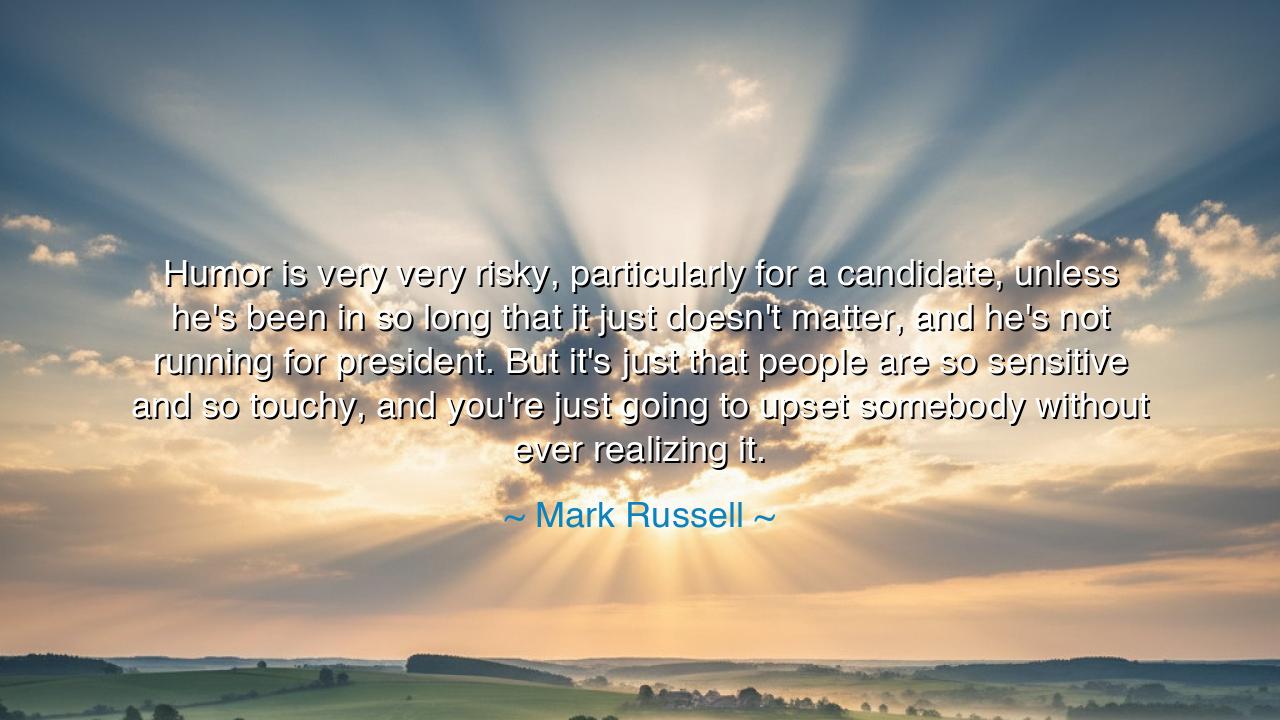
Humor is very very risky, particularly for a candidate, unless
Humor is very very risky, particularly for a candidate, unless he's been in so long that it just doesn't matter, and he's not running for president. But it's just that people are so sensitive and so touchy, and you're just going to upset somebody without ever realizing it.






Listen well, O children of wisdom, to the words of Mark Russell, a sage of modern times: "Humor is very, very risky, particularly for a candidate, unless he's been in so long that it just doesn't matter, and he's not running for president. But it's just that people are so sensitive and so touchy, and you're just going to upset somebody without ever realizing it." These words speak not only to the nature of humor, but to the power it holds and the dangers it presents, especially when wielded in the delicate realms of public life. Humor, when used with care, can unite and inspire, but when used recklessly, it can divide, wound, and alienate.
In the ancient world, the great orators and leaders understood that humor could be a tool of profound power, yet it also required wisdom and restraint. Aristophanes, the master playwright of Athens, knew the sharp edge of humor. His comedies, filled with biting satire, often ridiculed the political leaders and societal norms of his day. Yet, his humor was never without risk. The ancient Greeks understood that humor could expose truths, challenge power, and awaken the people, but it could also enrage the powerful and lead to retribution. Mark Russell’s words echo this timeless truth: humor in the realm of politics is fraught with peril, for it can upset those in power or those who are too sensitive to its bite.
Consider the story of Socrates, the great philosopher who walked the streets of Athens, engaging with citizens and challenging their assumptions. Socrates, despite his profound wisdom, often used humor in his dialogues to make his point—yet this humor was not always received well. His ironic questioning, his use of humor to expose the ignorance of others, led to his eventual trial and death. Though he was not a candidate for political office, Socrates’ humor was risky nonetheless. His ability to challenge the status quo made him a target of those in power. He understood that humor, when wielded in the pursuit of truth, was dangerous because it could upset the very people whose power was threatened by it.
The tension of humor in the political sphere is not just a matter of challenging the powerful, but also a reflection of the delicate balance between the public and their leaders. In ancient Rome, Julius Caesar was a master of wit, often using humor to win over the masses and disarm his political rivals. Yet, his sharp tongue and keen sense of humor did not protect him from those who grew weary of his rise to power. His assassination was not just the result of political intrigue, but also of the discomfort he caused in the very people he once sought to entertain. The lesson here is clear: humor, while it can win hearts and minds, can also deepen divides and bring about unforeseen consequences.
In the modern world, as Mark Russell suggests, the candidate who ventures into humor must tread lightly. The sensitivity of the times, the increasing polarization of societies, and the ever-watchful eyes of the public create a landscape where humor is no longer a simple tool for communication—it is a weapon that can either unite or destroy. Candidates who use humor to defuse tension or connect with their audience must always be aware of its potential to misfire. In a world where everyone seems to be offended by the slightest misstep, the risk of using humor becomes greater, and the political ramifications of offending even a small group of people can be catastrophic.
Humor also requires a self-awareness that not all audiences will share the same sensibilities or sense of humor. What might seem like a harmless jest to one may be a deep offense to another. The ancient rhetoricians, such as Cicero, knew that in delivering speeches, they must always consider their audience and the context. Cicero, a master of oratory, understood that humor could bring levity and endear the speaker to the people, but it also carried the risk of misinterpretation or offending the wrong faction. Like Mark Russell warns, in politics, humor must be wielded with caution—its power to divide or unite rests in the delicate balance of timing, tone, and intent.
And so, we must learn from the teachings of the ancients and from the wisdom of Mark Russell: humor is a powerful, yet risky tool. It is a gift that can connect, entertain, and enlighten, but it is also a force that can wound, divide, and alienate. In our own lives, we must be mindful of how we use humor, especially in public and political contexts. Let us not use humor to ridicule or belittle, but to uplift, to reveal the absurdities of life, and to challenge with grace and understanding. Humor, when used with wisdom, can bring us closer together, but when used recklessly, it can deepen the chasm between us.
Therefore, O future generations, heed this lesson: wield humor with care and awareness. Understand that what might bring laughter to one may bring offense to another. Be sensitive to the moment, be aware of your audience, and always consider the power of your words before using humor to challenge, to entertain, or to reveal. In doing so, you will master this great tool, and use it not to divide, but to unite, to heal, and to make the world a place where laughter and understanding can truly coexist.






AAdministratorAdministrator
Welcome, honored guests. Please leave a comment, we will respond soon